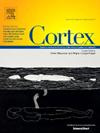在运动皮层和小脑上使用tDCS无法复制言语适应的增强
IF 3.3
2区 心理学
Q1 BEHAVIORAL SCIENCES
引用次数: 0
摘要
经颅直流电刺激(tDCS)调节皮质兴奋性,当与认知任务结合使用时,有可能提高表现。在语言领域,先前的研究表明,在感觉运动学习过程中,左侧运动皮层和右侧小脑的阳极tDCS增加了语言适应的幅度。在这里,我们的目标是在一项预先注册、双盲、随机、假对照的大样本研究(三组N = 30)中重复这些发现。参与者大声朗读单词。语音被记录下来并反馈给他们,要么是正常的,要么是第一个元音形成频率增加110-Mel。参与者通过改变他们的语言产出(适应)来回应改变的反馈。参与者被随机分配在左言语运动皮层、右小脑或假刺激上接受2 ma的淋巴结tDCS。我们使用单向方差分析测试了三组之间的语言适应差异。我们还探讨了语言适应与语言感知测量之间的关系。所有小组在接受改变的听觉反馈时都表现出显著的适应性。与以往的研究相反,我们没有发现阳极tDCS对语音适应的大小有影响。综上所述,言语运动皮层和小脑的淋巴结tDCS对言语适应没有影响。这项研究是tDCS对任务表现影响不一致的另一个例子,特别是当参与者年轻健康时。可能需要更大的样本来检测小的影响,并避免由于任务表现的个体差异而产生的虚假结果。本文章由计算机程序翻译,如有差异,请以英文原文为准。
Failure to replicate enhancement of speech adaptation using tDCS over motor cortex and cerebellum
Transcranial direct current stimulation (tDCS) modulates cortical excitability and when applied in combination with a cognitive task has potential to enhance performance. In the speech domain, previous work indicated that anodal tDCS over left motor cortex and right cerebellum increased the magnitude of speech adaptation during sensorimotor learning. Here, we aimed to replicate these findings in a pre-registered, double-blind, randomised, sham-controlled study of a large sample (three groups of N = 30). Participants read words out loud. Speech was recorded and fed back to them either normally or with a 110-Mel increase in the frequency of the first vowel formant. Participants responded to altered feedback by changing their speech production (adaptation). Participants were randomly allocated to receive 2-mA anodal tDCS over either left speech motor cortex, or right cerebellum, or sham stimulation. We tested for differences in speech adaptation among the three groups using one-way analyses of variance. We also explored the relationship between speech adaptation and measures of speech perception. All groups showed significant adaptation while receiving altered auditory feedback. Contrary to the previous study, we found no impact of anodal tDCS on the magnitude of the speech adaptation. In conclusion, speech adaptation was unaffected by anodal tDCS over speech motor cortex or cerebellum. This study is another example of the inconsistent effects of tDCS on task performance particularly when participants are young and healthy. Even larger samples may be needed to detect small effects and to avoid spurious results arising from individual differences in task performance.
求助全文
通过发布文献求助,成功后即可免费获取论文全文。
去求助
来源期刊

Cortex
医学-行为科学
CiteScore
7.00
自引率
5.60%
发文量
250
审稿时长
74 days
期刊介绍:
CORTEX is an international journal devoted to the study of cognition and of the relationship between the nervous system and mental processes, particularly as these are reflected in the behaviour of patients with acquired brain lesions, normal volunteers, children with typical and atypical development, and in the activation of brain regions and systems as recorded by functional neuroimaging techniques. It was founded in 1964 by Ennio De Renzi.
 求助内容:
求助内容: 应助结果提醒方式:
应助结果提醒方式:


